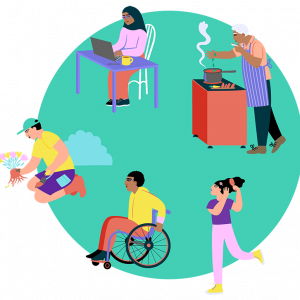Equity, diversity and belonging

RCOT, as a membership organisation, a professional body, and an employer, is committed to leading innovative change to promote equity and social justice and will build a sense of belonging for all our staff, members, and the populations we serve.
We aim to lead the profession by adopting and advocating for cultures which values, respects, and celebrates diversity and challenges inequality and discrimination.
Equity and social justice sit at the heart of everything we do, and our ambition is to be an organisation that robustly advocates and challenges inequity for and on behalf of our staff, our members, and the public.
We recognise that each of us is unique and therefore our definition of diversity will go beyond those defined in equality legislation and we will afford the same standards and principles to those with lived experiences.
We would like this webpage to act as a conduit for stimulating thoughts and discussion within our profession, from us, and very importantly from our members.
Ableism in OT practice
"Allyship: actively being anti-racist, anti-discriminatory and anti-oppressive” presentation
“Decolonise occupational therapy” presentation
Unison resources
Useful resources
We will continue to add to this area with resources that you may find helpful. If you have any ideas for other things we should add, please contact Ketan Davé, ketan.dave@rcot.co.uk
If you need independant discrimination advice, contact the Equality and Human Rights Commission.
Equalities legislation
The Equality Act 2010 covers everyone in England, Scotland and Wales and protects people from discrimination (direct or indirect), harassment, and victimisation. It came into force on 1 October 2010. It brings together over 116 separate pieces of legislation into one single Act so that it is easier to use. Under the Act, there are nine protected characteristics: age, disability, gender reassignment, marriage and civil partnership, pregnancy and maternity, race, religion or belief, sex, sexual orientation. The Equality Act does not apply to Northern Ireland.
- Equality Act 2010 | EHRC (equalityhumanrights.com)
- Protected characteristics | EHRC (equalityhumanrights.com)
- Sex discrimination | EHRC (equalityhumanrights.com)
- Marriage and civil partnership discrimination | EHRC (equalityhumanrights.com)
- Sexual orientation discrimination | EHRC (equalityhumanrights.com)
- Race discrimination | EHRC (equalityhumanrights.com)
- Age discrimination | EHRC (equalityhumanrights.com)
- Pregnancy and maternity discrimination | EHRC (equalityhumanrights.com)
- Religion or belief discrimination | EHRC (equalityhumanrights.com)
- Disability discrimination | EHRC (equalityhumanrights.com)
- Gender reassignment discrimination | EHRC (equalityhumanrights.com)
- Direct and indirect discrimination | EHRC (equalityhumanrights.com)
- Harassment and victimisation | EHRC (equalityhumanrights.com)
- Terms used in the Equality Act | EHRC (equalityhumanrights.com)
- Equality Advisory and Support Service | EHRC (equalityhumanrights.com)
- Individuals | EHRC (equalityhumanrights.com)
- Public sector | EHRC (equalityhumanrights.com)
- Business | EHRC (equalityhumanrights.com)
In Northern Ireland, equality and anti-discrimination law is not consolidated into one single act. Equality areas are: age; disability; gender/sex (including trans); race; religious belief/political opinion; sexual orientation. There are several pieces of legislation covering the above equality areas, all underpinned by Section 75 of the Northern Ireland Act 1998
